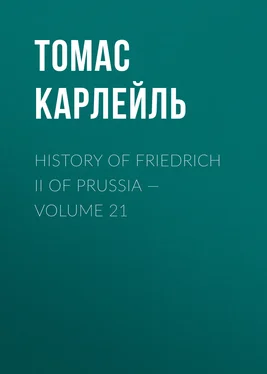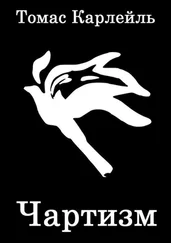Томас Карлейль - History of Friedrich II of Prussia — Volume 21
Здесь есть возможность читать онлайн «Томас Карлейль - History of Friedrich II of Prussia — Volume 21» — ознакомительный отрывок электронной книги совершенно бесплатно, а после прочтения отрывка купить полную версию. В некоторых случаях можно слушать аудио, скачать через торрент в формате fb2 и присутствует краткое содержание. Жанр: foreign_prose, История, literature_19, foreign_edu, foreign_antique, на английском языке. Описание произведения, (предисловие) а так же отзывы посетителей доступны на портале библиотеки ЛибКат.
- Название:History of Friedrich II of Prussia — Volume 21
- Автор:
- Жанр:
- Год:неизвестен
- ISBN:нет данных
- Рейтинг книги:3 / 5. Голосов: 1
-
Избранное:Добавить в избранное
- Отзывы:
-
Ваша оценка:
- 60
- 1
- 2
- 3
- 4
- 5
History of Friedrich II of Prussia — Volume 21: краткое содержание, описание и аннотация
Предлагаем к чтению аннотацию, описание, краткое содержание или предисловие (зависит от того, что написал сам автор книги «History of Friedrich II of Prussia — Volume 21»). Если вы не нашли необходимую информацию о книге — напишите в комментариях, мы постараемся отыскать её.
History of Friedrich II of Prussia — Volume 21 — читать онлайн ознакомительный отрывок
Ниже представлен текст книги, разбитый по страницам. Система сохранения места последней прочитанной страницы, позволяет с удобством читать онлайн бесплатно книгу «History of Friedrich II of Prussia — Volume 21», без необходимости каждый раз заново искать на чём Вы остановились. Поставьте закладку, и сможете в любой момент перейти на страницу, на которой закончили чтение.
Интервал:
Закладка:
Head-engineer De Launay, one may guess, would be consulted by Helvetius in choice of the subaltern Officials, the stokers and steerers in this new Steam-Machinery, which had all to be manned from France. There were Four heads of departments immediately under De Launay, or scarcely under him, junior brothers rather:—who chose these I did not hear; but these latter, it is evident, were not a superior quality of people. Of these Four,—all at very high salaries, from De Launay downwards; "higher than a Prussian Minister of State!" murmured the public,—two, within the first year, got into quarrel; fought a duel, fatal to one of them; so that there were now only Three left. "Three, with De Launay, will do," opined Friedrich; and divided the vacant salary among the survivors: in which form they had at least no more duelling.
As to the subaltern working-parties, the VISITATEURS, CONTROLLEURS, JAUGEURS (Gaugers), PLOMBEURS (Lead-stampers), or the strangest kind of all, called "Cellar-Rats (COMMIS RATS-DE-CAVE), "they were so detested and exclaimed against, by a Public impatient of the work itself, there is no knowing what their degree of scoundrelism was, nor even, within amazingly wide limits, what the arithmetical number of them was. About 500 in the whole of Prussia, says a quiet Prussian, who has made some inquiry; ["Beguelin, ACCISE-UND ZOLL-VERFASSUNG, s. 138" (Preuss, iii, 18).] 1,500 says Mirabeau; 3,000 say other exaggerative persons, or even 5,000; De Launay's account is, Not at any time above 200. But we can all imagine how vexatious they and their business were. Nobody now is privileged with exemption: from one and all of you, Nobles, Clergy, People, strict account is required, about your beers and liquors; your coffee, salt; your consumptions and your purchases of all excisable articles:—nay, I think in coffee and salt, in salt for certain, what you will require, according to your station and domestic numbers, is computed for you, to save trouble; such and such quantities you will please to buy in our presence, or to pay duty for, whether you buy them or not. Into all houses, at any hour of the day or of the night, these cellar-rats had liberty,—(on warrant from some higher rat of their own type, I know not how much higher; and no sure appeal for you, except to the King; tolerably sure there, if you be INNOCENT, but evidently perilous if you be only NOT-CONVICTED!)—had liberty, I say, to search for contraband; all your presses, drawers, repositories, you must open to these beautiful creatures; watch in nightcap, and candle in hand, while your things get all tumbled hither and thither, in the search for what perhaps is not there; nay, it was said and suspected, but I never knew it for certain, that these poisonous French are capable of slipping in something contraband, on purpose to have you fined whether or not.
Readers can conceive, though apparently Friedrich did not, what a world of vexation all this occasioned; and how, in the continual annoyance to all mankind, the irritation, provocation and querulous eloquence spread among high and low. Of which the King knew something; but far from the whole. His object was one of vital importance; and his plan once fixed, he went on with it, according to his custom, regardless of little rubs. The Anecdote Books are full of details, comic mostly, on this subject: How the French rats pounced down upon good harmless people, innocent frugal parsonages, farm-houses; and were comically flung prostrate by native ready wit, or by direct appeal to the King. Details, never so authentic, could not be advisable in this place. Perhaps there are not more than Two authentic Passages, known to me, which can now have the least interest, even of a momentary sort, to English readers. The first is, Of King Friedrich caricatured as a Miser grinding Coffee. I give it, without essential alteration of any kind, in Herr Preuss's words, copied from those of one who saw it:—the second, which relates to a Princess or Ex-Princess of the Royal House, I must reserve for a little while. Herr Preuss says:—
"Once during the time of the 'Regie' [which lasted from 1766 to 1786 and the King's death: no other date assignable, though 1768, or so, may be imaginable for our purpose], as the King came riding along the Jager Strasse, there was visible near what is called the Furstenhaus," kind of Berlin Somerset House, [Nicolai, i. 155.] "a great crowd of people. 'See what it is!' the King sent his one attendant, a heiduc or groom, into it, to learn what it was. 'They have something posted up about your Majesty,' reported the groom; and Friedrich, who by this time had ridden forward, took a look at the thing; which was a Caricature figure of himself: King in very melancholy guise, seated on a Stool, a Coffee-mill between his knees; diligently grinding with the one hand, and with the other picking up any bean that might have fallen. 'Hang it lower,' said the King, beckoning his groom with a wave of the finger: 'Lower, that they may not have to hurt their necks about it!' No sooner were the words spoken, which spread instantly, than there rose from the whole crowd one universal huzza of joy. They tore the Caricature into a thousand pieces, and rolled after the King with loud (LEBE HOCH, Our Friedrich forever!' as he rode slowly away." [Preuss, iii. 275 ("from BERLIN CONVERSUTIONSBLATT &c. of 1827, No. 253").) That is their Friedrich's method with the Caricature Department. Heffner, Kapellmeister in Upsala, reports this bit of memorability; he was then of the King's Music-Chapel in Berlin, and saw this with his eyes.
The King's tendency at all times, and his practice generally, when we hear of it, was to take the people's side; so that gradually these French procedures were a great deal mitigated; and DIE REGIE—so they called this hateful new-fangled system of Excise machinery—became much more supportable, "the sorrows of it nothing but a tradition to the younger sort," reports Dohm, who is extremely ample on this subject. [Christian Wilhelm von Dohm, Denkwurdigkeiten meiner Zeit (Lemgo und Hanover, 1819), iv. 500 et seq.] De Launay was honorably dismissed, and the whole Regie abolished, a month or two after Friedrich's death.
With a splenetic satisfaction authentic Dohm, who sufficiently condemns the REGIE, adds that it was not even successful; and shows by evidence, and computation to the uttermost farthing, that instead of two million thalers annually, it yielded on the average rather less than one. The desired overplus of two millions, and a good deal more did indeed come in, says he: but it was owing to the great prosperity of Prussia at large, after the Seven-Years War; to the manifold industries awakening, which have gone on progressive ever since. Dohm declares farther, that the very object was in a sort fanciful, nugatory; arguing that nobody did attack Friedrich;—but omitting to prove that nobody would have done so, had Friedrich NOT stood ready to receive him. We will remark only, what is very indisputable, that Friedrich, owing to the Regie, or to other causes, did get the humble overplus necessary for him; and did stand ready for any war which might have come (and which did in a sort come); that he more and more relaxed the Regie, as it became less indispensable to him; and was willing, if he found the Caricatures and Opposition Placards too high posted, to save the poor reading people any trouble that was possible.
A French eye-witness testifies: "They had no talent, these Regie fellows, but that of writing and ciphering; extremely conceited too, and were capable of the most ridiculous follies. Once, for instance, they condemned a common soldier, who had hidden some pounds of tobacco, to a fine of 200 thalers. The King, on reviewing it for confirmation, wrote on the margin: 'Before confirming this sentence, I should wish to know where the Soldier, who gets 8 groschen [ninepence halfpenny] in the 5 days, will find the 200 crowns for paying this Fine!'" [Laveaux (2d edition), iii. 228.] Innumerable instances of a constant disposition that way, on the King's part, stand on record. "A crown a head on the import of fat cattle, Tax on butcher's-meat?" writes he once to De Launay: "No, that would fall on the poorer classes: to that I must say No. I am, by office, Procurator of the Poor (L'AVOCAT DU PAUVRE)." Elsewhere it is "AVOCAT DEC PAUVRE ET DU SOLDAT (of the working-man and of the soldier); and have to plead their cause." [Preuss, iii. 20.]
Читать дальшеИнтервал:
Закладка:
Похожие книги на «History of Friedrich II of Prussia — Volume 21»
Представляем Вашему вниманию похожие книги на «History of Friedrich II of Prussia — Volume 21» списком для выбора. Мы отобрали схожую по названию и смыслу литературу в надежде предоставить читателям больше вариантов отыскать новые, интересные, ещё непрочитанные произведения.
Обсуждение, отзывы о книге «History of Friedrich II of Prussia — Volume 21» и просто собственные мнения читателей. Оставьте ваши комментарии, напишите, что Вы думаете о произведении, его смысле или главных героях. Укажите что конкретно понравилось, а что нет, и почему Вы так считаете.









